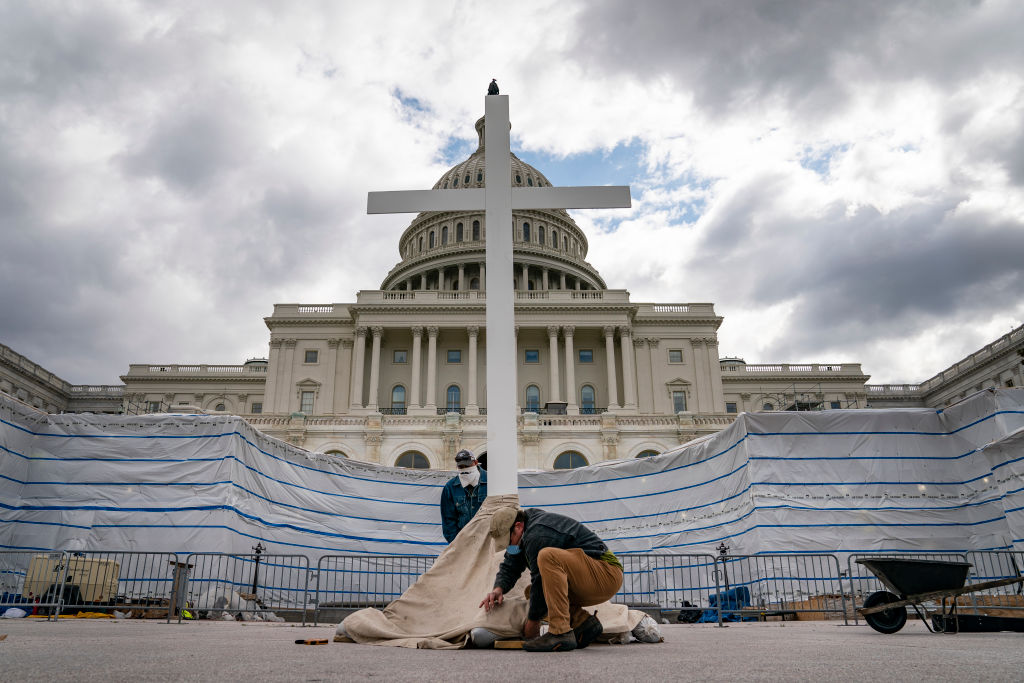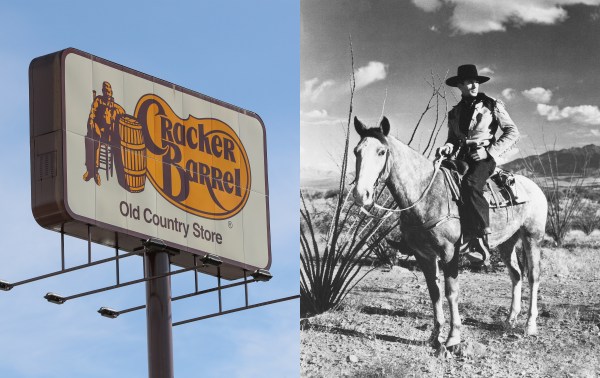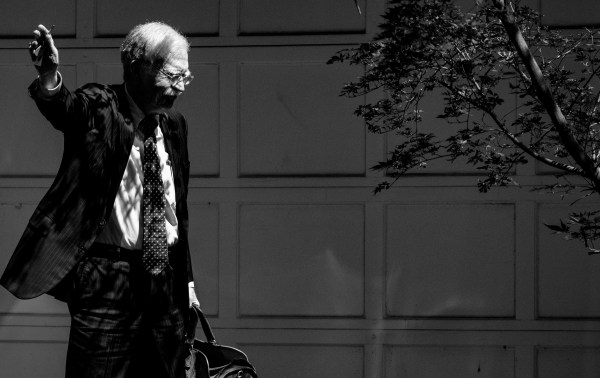Last month Oklahoma state Sen. Dusty Deevers, a pastor and self-identified Christian nationalist, filed bills to legally prohibit sexting outside of marriage and forbid “no-fault” divorce. In a recent interview, Deevers declared that a nation either becomes a “serpentine theocracy,” in which Satan is running the show, or it follows the rule of God, and that there “is no in-between.”
Some evangelicals affiliated with the group Right Response Ministries have put together a statement on Christian nationalism, with Deevers and another pastor serving as its main authors. They define Christian nationalism as a set of governing principles that arise from the biblical claim that Jesus is the Lord of all creation. Therefore, civil magistrates rule under Him and for his glory. They claim that nations must “officially affirm the orthodox Christian faith” and “bring God’s Word into the civil sphere” by, for instance, refusing to tolerate “open perversion.” While the authors of the document are careful to distance themselves from intolerance toward non-Christians, Deevers has made clear that plenty of non-Christian behaviors and products, such as the “production, distribution, or consumption” of pornography, will have to go.
Defining Christian nationalism can be difficult, so we’ll accept the statement as a working definition. But with a cascade of articles and books on Christian nationalism, it’s worth considering the much richer Christian tradition about what is required of people who claim Jesus Christ as their king—and the tenets of Christian nationalism are not, in fact, a good idea.
While some estimates place alignment with Christian nationalism at a whopping 52 percent of Americans, more careful polling puts it closer to 18 percent. Our contention is not necessarily that a statistically significant subset of white evangelical Christians (and it is predominantly white evangelicals espousing such beliefs, not black, Asian, or Hispanic evangelicals) want to rule everybody. Rather it’s that this subgroup’s tenuous grasp on political theology is leading it to stumble in its response to dramatic cultural changes.
Historically, Christian theologians have had much to say on issues such as the relationship between the civil law and the law of God, in times of cultural decay as bad—or worse—than our own. Their wisdom leads us in a different direction than Christian nationalism. But first we have to begin with the Bible.
Christian nationalists and Jewish Zealots.
Though only a tiny minority of Christian nationalists today call for actions as extreme as violent revolution, we can otherwise see a similar understanding of faith and public life in another ancient group. In his Antiquities of the Jews, Jewish historian Josephus tells us about another would-be messiah incensed by the very census that sent Joseph and Mary to Bethlehem, or perhaps more accurately, the new taxes that always follow a census. Judas of Galilee led the Zealot movement, rousing others to violent revolution with the claims that “this taxation was no better than an introduction to slavery,” and that “God would not otherwise be assisting to them” unless they revolted. Josephus records the tragic outcome: “one violent war came upon us after another.” These “Zealots agree in all other things with the Pharisaic notions; but they have an inviolable attachment to liberty, and say that God is to be their only Ruler and Lord.”
Today, the Christian nationalist statement grounds the same sentiment in the Great Commission from the book of Matthew: “WE DENY that there is any sphere of life in which the command ‘teach them to obey all that I have commanded’ does not apply, including politics and government.” The question, then, is whether Jesus endorsed the Zealots’ understanding of faith and public life in his commands.
He did not. “Is it lawful to pay taxes to Caesar, or not?” the Pharisees asked Jesus. We know Judas of Galilee’s answer: No! Thus, the Pharisees are asking Jesus whether he agrees with the Zealots, hoping to trap him into either sounding like a revolutionary if he does or a traitor if he doesn’t. But what did Jesus say? Noting that it was Caesar’s image and inscription on the currency, he replied, “Render therefore to Caesar the things that are Caesar’s, and to God the things that are God’s.”
Jesus clearly distinguishes between the kingdom of God and the earthly kingdom of Caesar, acknowledging the legitimacy of the latter, despite all its impiety, even while privileging the former. British historian Lord Acton rightly identified the civilizational significance of this: “those words … gave to the civil power, under the protection of conscience, a sacredness it had never enjoyed, and bounds it had never acknowledged; and they were the repudiation of absolutism and the inauguration of freedom.” The gospel of Jesus Christ is greater than the Christian nationalist either/or.
A Christian alternative to legislating the Bible.
Traditionally, Christians have distinguished between moral, natural, divine, and civil law. The Christian nationalist statement acknowledges natural law, which is the term for moral law—basic right and wrong—as it’s grasped by reason and conscience. Because of the natural law, anyone could be expected to agree with “do not murder” or “do not steal.”
Divine law, by contrast, grasps the moral law through divine revelation: the Bible. By too closely identifying natural and divine law, the Christian nationalist statement does not properly account for the many commands that apply only to the special case of ancient Israel. Rather, Thomas Aquinas argued that human governments derive their laws from the natural law, not divine, and that civil law is limited in scope to only “greater harms” and things relevant to peace between neighbors. Because Christian nationalists fail to make these distinctions, their all-or-nothing theology obscures the relationship between natural law and civil law, collapsing both into an impractical biblicism at best and claiming the authority of God himself for their cause.
But why doesn’t that work? Consider that Jesus taught that on the commands to love God and one’s neighbor “hang all the Law and the Prophets.” So why don’t we just have these two laws and no constitutions, charters, legal codes, or regulations? Wouldn’t such a polity be the most Christian of all nations? The logic of Christian nationalists should lead them there, but even they don’t go that far.
The answer, at least in our fallen world, is no. Understood in more traditional Christian terms, natural law is “written in [our] hearts” by God and made known through conscience. It should indeed morally ground our civil laws. But like God, natural law does not change—otherwise right and wrong would be totally subjective. Civil law, on the other hand, changes all the time. Civil laws must be debated and written by humans, tailored to their specific contexts by legitimate authorities and justly enforced. Even pagan Rome grounded its civil laws in the natural law, and thus Jesus could say, “render to Caesar.”
That God provided the divine law for ancient Israel does not give warrant for ripping it out of its context and trying to force it into our own, like a square peg into a round hole. Famously, “theonomists” such as R.J. Rushdoony and Gary North argued that the laws of the Old Testament requiring a death sentence for everything from lying about one’s virginity to idolatry ought to be applied today. However, with few exceptions, even historic Christian polities did not attempt to apply the laws of ancient Israel to themselves. Rather, for example, Christian Rome, as evidenced by Justinian’s Institutes, grounded its civil law not by quoting Bible verses but by appealing to natural law, without collapsing the civil law into the natural or divine. It acknowledged its own shortcomings, such as its failure to abolish slavery even though “Freedom … is a man’s natural power,” while also commending the strengths of its civil law, such as the ease, compared to other nations, with which slaves could be freed. While Christians ought to work to align the civil laws of their polities ever closer to the natural law, civil laws can only ever be an approximation, even in Christian empires. How much more so, then, in pluralistic republics like our own?
Deevers is right that the public sphere is not some “neutral” space apart from morality or God, but he misses that Christians don’t need to legislate divine law again in order for their nation to be truly Christian. Rather, because of the natural law, by which all people are free and equal, the public sphere should be impartial, and in that sense, classically liberal (not to be confused with “progressively liberal”), while nevertheless morally grounded. Christians through the ages have known and acknowledged this—such as with the Edict of Milan, which granted universal religious liberty—even if they often failed to live up to it.
Moreover, ancient Christians did establish a body of law based on divine revelation: ecclesiastical canon law, the law of church discipline. While still distinct in all the ways civil law is from natural law, it could go beyond civil law by dealing with personal sin through church discipline for those Christians trying to live a life of repentance, not imposed upon anyone except church members. Christian nationalists longing for law that reflects divine revelation ought to spend more time reclaiming this tradition for their churches and remember to “render to Caesar” when it comes to the state.
Beyond church and state.
When faced with a truly godless state, the Lutheran pastor and theologian Dietrich Bonhoeffer went as far as joining the Abwehr resistance that sought to undermine the Nazis from the inside, resulting in his arrest and execution at Flossenbürg concentration camp in 1945. So one might expect Bonhoeffer to favor radical politics, yet in his unfinished Ethics, he strikes a far healthier balance between faith and public life than Christian nationalists today.
Drawing on Genesis, Christian natural law, and Martin Luther, Bonhoeffer identified four “estates” or “mandates” of creation: family, work or culture, church, and government. Through the church, Christians ought to live changed lives in all their vocations: “It is the Christian who is at once labourer, partner in marriage and subject of a government.” Yet the state’s role is clearly limited to “making law to consist in the acknowledgment of the divine mandates”—the other estates of society, not all the commandments of the Bible. Thus, even if Christian nationalists want to do the right things, they’re looking to the wrong authorities to bring them about. As Bonhoeffer notes, there’s more to society than just church and state. Culture and family have essential roles to play, too.
When Jimmy Fallon roasted Sen. Deevers’ sexting ban on The Tonight Show, Deevers responded elegantly with a lament over the damage porn has done, calling for repentance. No serious believer could disagree. But many rightly differ regarding the proper use of state power and the massive and invasive expansion that would be needed, for example, for the state to screen everyone’s text messages. The imposition of violence is different from persuasion, parental guidance, or religious exhortation. Therefore, the state’s power to impose violence ought to arise narrowly from the need for maintaining peace. The inability to save our friends and fellow citizens from sinful choices can be frustrating, but calm returns when we remember that it is not Caesar’s job, but God’s.






Please note that we at The Dispatch hold ourselves, our work, and our commenters to a higher standard than other places on the internet. We welcome comments that foster genuine debate or discussion—including comments critical of us or our work—but responses that include ad hominem attacks on fellow Dispatch members or are intended to stoke fear and anger may be moderated.
With your membership, you only have the ability to comment on The Morning Dispatch articles. Consider upgrading to join the conversation everywhere.